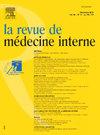Utilisation de l’hydroxychloroquine dans les pathologies obstétricales récurrentes à médiation immune (en dehors du lupus systémique) : fondements et preuves scientifiques
IF 0.7
4区 医学
Q3 MEDICINE, GENERAL & INTERNAL
引用次数: 0
Abstract
Hydroxychloroquine (HCQ), a synthetic antimalarial, is recognized for its immunomodulatory, anti-inflammatory and vascular-protective effects. In 20–30% of cases of primary obstetrical antiphospholipid syndrome (APS), the combination of antiplatelet aggregation and prophylactic anticoagulation fails to prevent obstetrical complications, a situation referred to as refractory obstetrical APS. This is partly due to the pro-inflammatory effects of antiphospholipid antibodies (aPL) binding to decidual and trophoblastic cells, which compromise embryonic implantation and placentation. Experimental studies in vitro and in mouse models have shown that HCQ can inhibit the detrimental effect of aPLs on trophoblastic invasion, findings corroborated by retrospective observational clinical studies. However, no randomized controlled trial has evaluated the addition of HCQ to conventional therapy for refractory obstetric APS. The hypothesis of allo-immune and/or autoimmune mechanisms involved in cases of recurrent pregnancy loss (RPL) with no identified cause and in chronic intervillositis of unknown etiology (CIUE) has led to the empirical use of HCQ in these indications. However, current evidence does not support its use in unexplained RPL. A few clinical studies of low scientific evidence suggest a benefit of HCQ in CIUE, but further data are needed. Finally, pre-eclampsia (PE) is another pregnancy-related condition at risk of recurrence, and its pathogenesis also seems to involve an imbalance in immune responses. HCQ's antioxidant properties could have a positive effect on endothelial dysfunction, a key component of PE.
[羟氯喹在复发性免疫介导的产科疾病(系统性狼疮除外)中的应用:科学依据和证据]。
羟氯喹(HCQ)是一种合成抗疟药,具有免疫调节、抗炎和血管保护作用。在20-30%的原发性产科抗磷脂综合征(APS)病例中,联合抗血小板聚集和预防性抗凝不能预防产科并发症,这种情况被称为难治性产科APS。这部分是由于抗磷脂抗体(aPL)与蜕膜细胞和滋养层细胞结合的促炎作用,这损害了胚胎着床和胎盘。体外和小鼠模型的实验研究表明,HCQ可以抑制apl对滋养细胞侵袭的有害作用,这一发现得到回顾性观察性临床研究的证实。然而,尚无随机对照试验评估将HCQ添加到难治性产科APS的常规治疗中。同种免疫和/或自身免疫机制参与的假设复发性妊娠丢失(RPL)没有明确的原因和慢性绒毛间炎病因不明(CIUE)的情况下,导致经验使用HCQ在这些适应症。然而,目前的证据并不支持其用于不明原因的RPL。一些低科学证据的临床研究表明,HCQ对CIUE有益,但需要进一步的数据。最后,子痫前期(PE)是另一种有复发风险的妊娠相关疾病,其发病机制似乎也涉及免疫反应的不平衡。HCQ的抗氧化特性可能对内皮功能障碍有积极作用,内皮功能障碍是PE的关键成分。
本文章由计算机程序翻译,如有差异,请以英文原文为准。
求助全文
约1分钟内获得全文
求助全文
来源期刊

Revue De Medecine Interne
医学-医学:内科
CiteScore
0.70
自引率
11.10%
发文量
526
审稿时长
37 days
期刊介绍:
Official journal of the SNFMI, La revue de medecine interne is indexed in the most prestigious databases. It is the most efficient French language journal available for internal medicine specialists who want to expand their knowledge and skills beyond their own discipline. It is also the main French language international medium for French research works. The journal publishes each month editorials, original articles, review articles, short communications, etc. These articles address the fundamental and innumerable facets of internal medicine, spanning all medical specialties. Manuscripts may be submitted in French or in English.
La revue de medecine interne also includes additional issues publishing the proceedings of the two annual French meetings of internal medicine (June and December), as well as thematic issues.
 求助内容:
求助内容: 应助结果提醒方式:
应助结果提醒方式:


